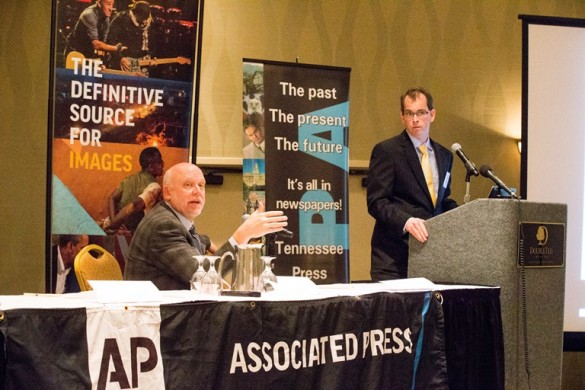
Time is working in favor of the acceptance of gay marriage and civil unions, even in conservative Tennessee, according to data from a series of Vanderbilt Polls shared at The Associated Press – Tennessee Press Association legislative planning session Feb. 5 in Nashville.
Support for civil unions climbed from 17 percent in November 2013 to 25 percent in November 2014. Support for allowing gays to marry held at 32 percent during the same time period. So, 57 percent of the public supported some sort of legal recognition of gay couples. That proportion jumps to 76 percent of Millennials (ages 18-24) in November 2014, followed closely by Generation Xers (25-44) at 70 percent.
“Support overall is a little less on average than the country because Tennessee is more conservative,” said John Geer, Gertrude Conaway Vanderbilt Professor of Political Science and co-director of the Vanderbilt Poll.
“[rquote]But it’s changing and it’s going to continue to change because the support is concentrated in the younger generations.[/rquote] As people die and other people enter the voting public, support for legal recognition of gay couples will increase.”
The Vanderbilt Poll is conducted just prior and then after each session of the Tennessee General Assembly, in order to gauge how closely the concerns of citizens align with their representatives in Nashville. The November 2014 poll surveyed 949 registered voters and has a margin of error of plus or minus 3.7 percentage points.
Voters in the poll showed little or no support for legislative efforts to change Tennessee’s open primary election system. Under the system, all voters are free to vote in one primary election without regard for their own political affiliation. If primaries were changed to closed elections, Republicans could only vote in the Republican primary and Democrats could only vote in the Democratic primary.
“However you slice it, open primaries are popular,” Geer said. “Among conservatives, among Democrats, among Republicans, especially among Tea Partiers.”
In fact, 82 percent of those polled in November 2013 favored open primaries, compared to 17 percent who preferred they be closed.
“Voters like choice,” said Josh Clinton, professor of political science and co-director of the Vanderbilt Poll. “The only constituency that wants closed primary elections are people who think their primaries are getting raided by members of the other party. However, there is almost no proof that this actually occurs or that it hurts the electoral prospects of the candidate selected in the open primary.”
By comparing Vanderbilt Poll results with the findings of a national poll by the Washington Post and ABC News, Geer and Clinton discerned that sometimes the identity of the messenger trumps the message itself.
Tennessee Gov. Bill Haslam’s Tennessee Promise initiative to make two years of community college free to every high school graduate in the state garnered 86 percent support in the May 2014 Vanderbilt Poll. But when President Obama announced a nearly identical national proposal inspired by Haslam’s program, it only rated 50 percent approval in a January 2015 Washington Post/ABC poll.
“The messenger matters,” Clinton said. “Something that has wide support can get tangled up with what people think about the politician delivering the message, and that can completely overwhelm their views about the specific policy being discussed.”
The Vanderbilt Poll is conducted by Princeton Survey Research Associates International. More information is available at the website of the Center for the Study of Democratic Institutions.